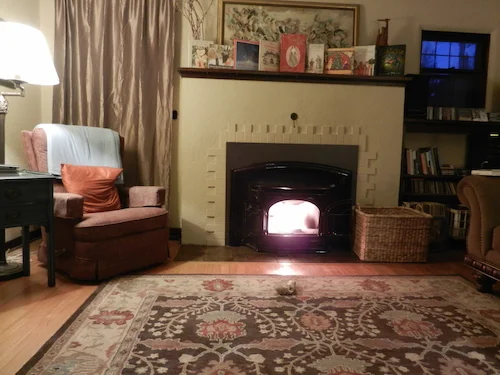Of Silence, Wildness, and Saint Ignatius
Two years ago a small group from my parish gathered for an intentional silent retreat. A few people in the group knew each other already, but most of us were strangers to one another and to the place where we met. To get there you must first drive an hour and a half northwest toward the ocean, then meander through a national wildlife sanctuary (with a band of donkeys wandering the hillsides) until you can’t go any farther. All along the way, you’re slowly enveloped by a web of forest and fog, mist and mystery. You must trust that the circuitous gravel road does indeed lead somewhere, and that there good things await you at the other end.
Our hosts — the Jesuits — run a rustic, remote, and storm-battered retreat center consisting of a longhouse for meals and meetings, the caretakers’ quarters, one dormitory, and a handful of slowly crumbling cabins. Also a yurt for worship — a canvas-covered nest where we spent much of our time. All of this is perched on the edge of Nestucca Bay with a roaring Pacific ocean in view — the perfect tonic of wildness that Thoreau spoke of. Even the gray gloom of a long Oregon winter looks better out there. As Lent proceeds, I find myself longing for Nestucca again, for its quiet signs and wonders.
We began in silence on Friday evening, hearing only the “Surrender” prayer by St. Ignatius, one of our spiritual guides for the weekend:
Take, O Lord, and receive my entire liberty, my memory, my understanding, and my whole will. All that I am and all that I possess You have given me: I surrender it all to You to be disposed of according to Your will. Give me only Your love and Your grace; with these I will be rich enough, and will desire nothing more.
We ate supper in silence, passed in silence on our way to the bathrooms, then slept in silence, the words of St. Ignatius sifting through our dreams until morning.
“Take out your pens and we’ll do ten minutes of free writing,” said Deacon Chris as we gathered just after sunrise.
While this struck terror in the hearts of some members in our group, I was in my element. Over the next two days we circled the wood stove in the yurt, wrapped in our blankets and slippers, and listened as Chris read from Wendell Berry, Mary Oliver, William Stafford, Richard Rohr, and finally a passage from the Sermon on the Mount. I was familiar with a couple of the poems — “The Peace of Wild Things” and “Ask Me” — but found myself hearing words anew as we practiced Lectio Divina with each reading, lines and phrases jumping out like sparks from the fire.
One image in particular, from Oliver’s “Five A.M. in the Pine Woods,” kept haunting me: two deer that the poet stumbles upon while out for an early morning walk. She calls them “two mute and beautiful women.” They stare at her as if they know her, and then turn and walk away. When we left the yurt for lunch, shortly after reading this, two does stood close together on the path, not ten feet from the doorway. Like they’d stepped right out of the poem.
A week before the retreat I had lost a favorite dialysis patient I had worked with for three years as part of my arts-in-healthcare job. Her name was Joy; she died February 1st. A month before that, on January 1st, another friend had died of cancer — a woman named Gloria who loved to sing, who created a remarkable children’s choir in my town.
On the Saturday afternoon of that silent retreat, with free time to wander the grounds, my husband and I took a hike down the long, gravel road leading back to the highway. We had arrived in almost darkness and wanted to see things in daylight. Near where we first spotted donkeys in the mist, I looked down suddenly at the side of the road. A single yellow crocus bloomed, early since it was still February. Yellow was Joy’s favorite color. Directly across from that first flower of spring, a tiny warbler was singing its heart out on a barren bush. It too was alone, no other birds in the brush.
“You will know soon enough that this is a magical place,” said the Jesuit priest who lives there year-round, who welcomed us upon arrival. “You are on holy ground.”
On Sunday we gathered in the yurt once more. This time for worship, a kind of free-form mass, led by the priest, Deacon Chris, and ourselves. The walls of the yurt bore witness to the work we had done together — a collage of furtive, scribbled free-writings, cut and slashed, then pieced together again. Displayed like liturgical banners, but more cries of the heart, they were our sermon for the morning. We read our own words and those of our companions with new eyes. With our silence ended, tears flowed freely as we shared the bread and wine of Eucharist. We formed something broken but whole, glimpsing at surrender.


















